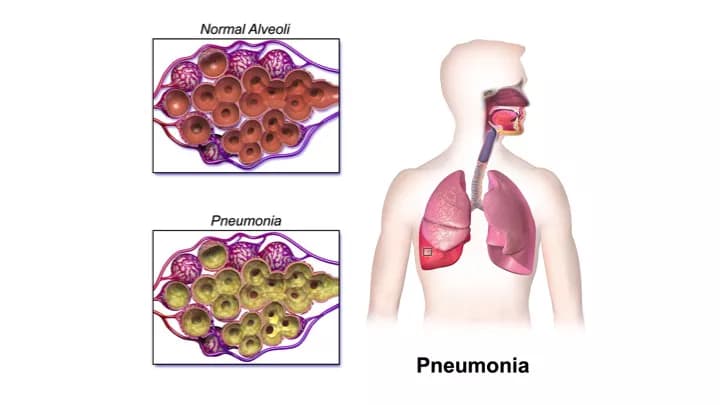
Viral Pneumonia
What are the other Names for this Condition? (Also known as/Synonyms)
- Pneumonia caused by Virus
What is Viral Pneumonia? (Definition/Background Information)
- Viral Pneumonia is an infection of the lungs, caused by a virus. The viruses that cause the condition may include adenovirus, respiratory syncytial virus, influenza virus, and other virus types
- It is characterized by swelling (inflammation) of the airways, causing the air sacs in the lungs to fill with mucus or other fluids, making it difficult for oxygen to arrive at the bloodstream
- About 50% of the pneumonia cases diagnosed each year are typically caused by viruses. However, Viral Pneumonia is usually less severe than pneumonia caused by bacteria
- The treatment of Viral Pneumonia may involve administering antiviral medications, corticosteroids, and taking plenty of rest
- The prognosis of Viral Pneumonia is generally good; normally, the condition improves within 1-2 weeks
Who gets Viral Pneumonia? (Age and Sex Distribution)
- Any individual is capable of developing Viral Pneumonia
- Infants and older adults (age 65 years and older) are more susceptible to having serious cases of pneumonia
- Both males and females are equally affected
- This infection occurs worldwide and all racial and ethnic groups are at risk
What are the Risk Factors for Viral Pneumonia? (Predisposing Factors)
The risk factors for Viral Pneumonia may include:
- Smoking
- Older adults (age 65 years and over) have a higher risk
- Having a weakened immune system - from an autoimmune disorder, medication, cancer, or organ transplant
- Heart or lung conditions in children
- Difficulty swallowing
- Chronic lung conditions such as COPD or bronchiectasis
- Other serious, chronic illnesses such as diabetes, heart disease, and liver cirrhosis
- Individuals who have recently undergone a surgical procedure
It is important to note that having a risk factor does not mean that one will get the condition. A risk factor increases ones chances of getting a condition compared to an individual without the risk factors. Some risk factors are more important than others.
Also, not having a risk factor does not mean that an individual will not get the condition. It is always important to discuss the effect of risk factors with your healthcare provider.
What are the Causes of Viral Pneumonia? (Etiology)
Viral Pneumonia is caused by any of the following viruses:
- Influenza virus (flu)
- Adenovirus
- Respiratory syncytial virus (RSV)
- Parainfluenza
Viral Pneumonia is typically less severe than a bacterial pneumonia. Although, having Viral Pneumonia puts one at risk of developing bacterial pneumonia.
What are the Signs and Symptoms of Viral Pneumonia?
Viral Pneumonia may occur with the following signs and symptoms:
- Cough; in some cases, mucus may be coughed-up
- Sharp pain in the chest, especially while breathing deeply or coughing
- Fever, shaking chills
- Shortness of breath, difficulty in breathing, wheezing
- Headache, muscle pain
- Sore throat
- Fatigue or low energy, loss of appetite
- Clammy skin or excessive sweating
- Confusion (especially observed in older adults)
How is Viral Pneumonia Diagnosed?
The diagnosis of Viral Pneumonia may involve the following tools:
- Complete physical examination and comprehensive evaluation of patient’s medical history
- Complete blood count (CBC)
- Chest X-ray
- CT scan of chest
- Blood cultures to identify specific viruses
- Nasal swab test
- Sputum culture
Many clinical conditions may have similar signs and symptoms. Your healthcare provider may perform additional tests to rule out other clinical conditions to arrive at a definitive diagnosis.
What are the possible Complications of Viral Pneumonia?
The following complications of Viral Pneumonia may be observed:
- Respiratory failure
- Sepsis - uncontrolled infection in the body that may lead to multiple organ failure
- Bacterial infections may occur during or following a bout of Viral Pneumonia. This is called secondary bacterial infection
- Liver failure
- Heart failure
How is Viral Pneumonia Treated?
The treatment measures for Viral Pneumonia may include:
- Antiviral medications can help improve pneumonia, when it is caused by influenza virus
- The treatment may include the use of corticosteroids and administration of oxygen
- Ibuprofen, acetaminophen, or aspirin may be taken to control fever
- Increased fluid intake can help loosen mucus and bring-up the phlegm
Note: It is not recommended to administer aspirin to children, as they may be affected by Reye’s syndrome.
How can Viral Pneumonia be Prevented?
A few recommended preventive measures for Viral Pneumonia include:
- Receive a flu shot once every year; pneumonia often occurs as a complication of influenza (or flu)
- Wash hands often with warm and soapy water, especially after blowing the nose, using the bathroom, before and after eating, etc.
- Avoid smoking, as smoking reduces the lungs’ ability to resist an infection
- Generally, avoid contact with individuals who are ill
- Eat healthy, exercise, and get sufficient rest
What is the Prognosis of Viral Pneumonia? (Outcomes/Resolutions)
- Most cases of Viral Pneumonia improve within 1-2 weeks
- More severe cases of Viral Pneumonia may require hospitalization and an extended period of treatment for a full recovery
Additional and Relevant Useful Information for Viral Pneumonia:
Antibiotics are not effective against Viral Pneumonia; but, they are helpful in treating bacterial infections that may occur after or during Viral Pneumonia.
Related Articles
Test Your Knowledge
Asked by users
Related Centers
Related Specialties
Related Physicians
Related Procedures
Related Resources
Join DoveHubs
and connect with fellow professionals

0 Comments
Please log in to post a comment.